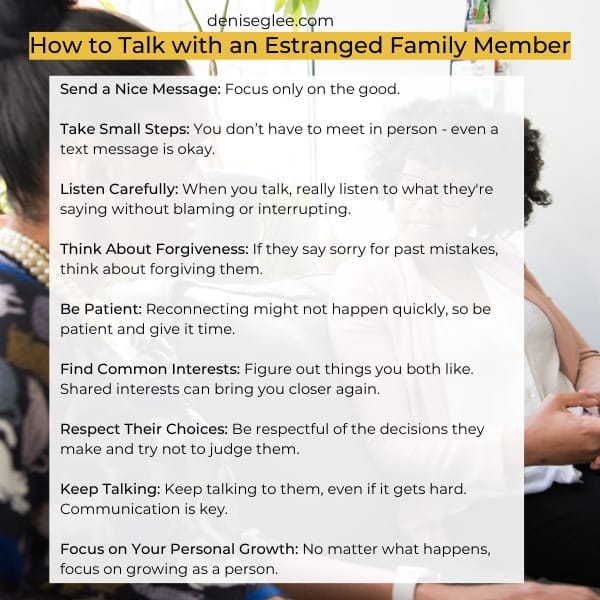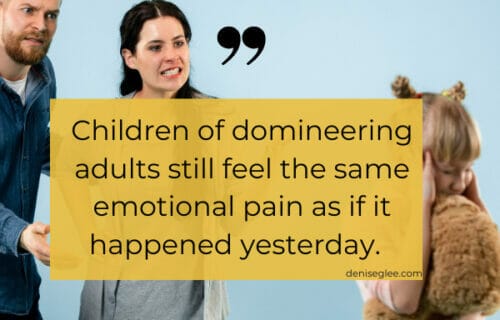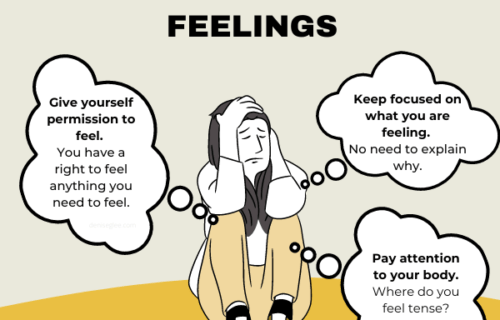
Reconnecting with Estranged Family Members: A Guide to Healing & Restoration
Yolanda said she wants to talk to family she hasn’t seen in a long time because they’re getting old. I asked her, “Are you sure you’re ready for what might happen next?”
It can be really tough for people who grew up in tough situations to reconnect with family. Maybe it’s because they’re getting older, or you see things differently now, or your life has changed, and you want to make things better. But before you call or plan a visit, you should get ready for what might come.
As a life coach for business people, I want to help you prepare for talking to a family member who treated you badly. It’s important for your mental health to approach them in a mature and safe way. This article will guide you on how to get ready for the conversation and dealing with a family member who has emotional challenges.
Because we don't know what people are suffering from, we tend to make conclusions about them and place them into one-dimensional characters. They are not villainous or out to get us; they are just emotionally limited and don't know how to express themselves in a healthy manner.
Denise G. Lee Tweet
They’re not evil or mean – they just have an emotional disability or low emotional intelligence
I don’t know what happened with you or your estranged family member(s), but odds at least person in the situation suffered or is suffering with an emotional disability or low emotional intelligence.
What is emotional intelligence (EI or EQ)?
Emotional intelligence is about understanding and managing emotions, both yours and other people’s. It helps in building good relationships, dealing with social situations, and making wise choices.
Psychologists Peter Salovey and John D. Mayer made EI known, and Daniel Goleman later explained it further in his book, Emotional Intelligence.
Goleman pointed out five main parts of emotional intelligence:
1. Knowing Yourself: Understand your emotions and how they affect your thoughts and actions.
2. Controlling Yourself: Manage your emotions, stay calm under pressure, and handle different situations.
3. Staying Driven: Have the energy and determination to reach your goals, even when things get tough.
4. Understanding Others: Get what others are feeling and be able to connect with them.
5. Social Skills: Build and keep good relationships, talk effectively, influence others, and work well in a team.
Why do some people have low EI or EQ?
It’s important to know that someone with emotional disabilities often faces big challenges when it comes to expressing their needs and feelings.
People have emotional disability due to a variety of reasons like:
- a chemical imbalance in their brain,
- not being good at communicating,
- stunted emotional intelligence due to past traumas.
And instead of openly saying what they feel, they use guilt-trips and threats to bully their way into getting their needs met.
Sometimes, it might seem easier for them to avoid talking about their emotions. Instead of saying, “I am scared,” they might say something like, “Why are you bothering me with this? It happened so many years ago.” But it’s important to remember that everyone’s emotional journey is different, and we should approach them with kindness and understanding.
How do you deal with people with low EI?
Instead of focusing on what they can or can’t express emotionally, let’s focus on what we can control—our own thoughts and actions.
By paying attention to our own emotions, being understanding, and really listening, we can make safe spaces for those around us to share how they feel. With patience and understanding, we can make the world more emotionally intelligent and supportive for everyone.
Now, let’s talk about how you can get ready for a tough conversation with someone who has emotional disabilities.
By paying attention to our own emotions, being understanding, and really listening, we can make safe spaces for those around us to share how they feel. With patience and understanding, we can make the world more emotionally intelligent and supportive for everyone.
Denise G. Lee Tweet
3 Tips to Remove Any Unrealistic Expectations
Before talking to your estranged family members, please understand that the odds are pretty high that they are emotionally disabled individuals. So, if that is the case, you need to keep the bar super low in terms of what to expect from them. That way, you won’t spend the next decade trying to avoid them.
Following these steps can aid in creating strong relationships with your loved ones.
Tip #1: Don’t expect an apology
Some of us are carrying a mile long list of grievances against our family members. And some of them are completely valid as some of us didn’t get our emotional, physical or psychological needs met as a child.
So please, don’t expect them to say sorry for things they did in the past. While some family members might have hurt us in different ways, wanting an apology can make you feel frustrated. Instead, focus on taking care of yourself and feeling empowered.
Write a list of everything you lacked as a child and find ways to give it to yourself as an adult. Next, find ways to nurture yourself now. For example, if you felt ignored by your parent or caregiver, now is the time to invest time in relationships with people who care about you and your feelings.
Tip #2: Think about your intentions
Before talking to your relative or former caregiver, understand why you want to do it and how you feel. Some people think that speaking in a mature and positive way will help their relatives act in kind.
The cold, hard truth is that modeling positive behavior is often not enough to help an emotionally disabled person. Nobody, including you, likes manipulative behavior.
If you cannot accept someone as they are and enjoy their company, it is better not to be in contact with them. This is because your desire to change them will only be met with resistance and will make you feel hopeless, sad, and frustrated.
Tip #3: Don’t always try to make others happy
Lots of us who were raised in a pain-filled family were trained to distract others from the dysfunction of the home.
So we as a child, and potentially even till today we chose to be:
- Wild child – Using our chaotic life to distract everyone from our parents’ raging alcoholism.
- Little Miss or Mister Perfect -From straight A’s, being the champion of our sports team, to having a shining heart and a perfect smile, we could never be seen as a disappointment. We were the bright spot in a very dark and sad home.
- Wallflower – Physically in the room but emotionally invisible to all.
Trying to act like a parent, relative, or caregiver to our emotionally disabled family member might seem like a good idea at first, but it doesn’t really help anyone in the end, including ourselves.
We can’t just keep trying to make everyone happy to make our relationships better. It’s important to be honest and open about how we feel, even if it’s hard.
Now, let’s talk about how to talk to a family member who is abusive or neglectful.

9 Steps to Reconnecting with an Estranged Family Member
Getting back in touch with family, especially if there have been problems or if you’ve been distant, can be tough. But here’s a simple guide to help you through it:
- Send a Nice Message: Start by reaching out with a kind message to begin reconnecting.
- Take Small Steps: Begin with small things like calling or writing first. Don’t rush it.
- Listen Carefully: When you talk, really listen to what they’re saying without blaming or interrupting.
- Think About Forgiveness: If they say sorry for past mistakes, think about forgiving them.
- Be Patient: Reconnecting might not happen quickly, so be patient and give it time.
- Find Common Interests: Figure out things you both like. Shared interests can bring you closer again.
- Respect Their Choices: Be respectful of the decisions they make and try not to judge them.
- Keep Talking: Keep talking to them, even if it gets hard. Communication is key.
- Focus on Your Personal Growth: No matter what happens, focus on growing as a person.
Remember, every family is different, so there’s no one perfect way to reconnect. Take care of yourself, even if things don’t turn out the way you hope. In the next section, I will share my final thoughts.

Final Thoughts
To sum up, fixing things with family members who are emotionally hurt can be hard but worthwhile. It’s a journey that can make you feel better and help you grow.
Every family is different, so the results of trying to reconnect can be different too. It’s crucial to focus on your own growth and happiness, even if things don’t go as you hoped. Enjoy the journey because, in trying to rebuild these relationships, you might discover healing and change that go beyond what you expected.
If you need help, don’t hesitate to contact me. Also, check out this episode from my podcast or read this article for more guidance on talking to difficult people in your family.





